Portugal Eyes Nigeria and US Gas to Break Free from Russian Dependence
Portugal Eyes Nigeria and US Gas to Break Free from Russian Dependence
By Achimi muktar
In a decisive move to cut ties with dwindling Russian energy supplies, Portugal has announced plans to ramp up imports of Liquefied Natural Gas (LNG) from Nigeria and the United States. This strategy aims to bolster energy independence amidst ongoing European sanctions against Russian oil and gas.
Portugal’s Shift from Russia
Portugal’s Environment Minister, Maria da Graça Carvalho, revealed the government’s commitment to diversifying energy sources during the World Economic Forum in Davos. Speaking at a panel discussion, she emphasized Portugal’s resolve to eliminate reliance on Russian gas entirely.
“Portugal is now practically independent of Russian gas… but we want to reduce this figure further by importing more gas from Nigeria and the United States,” Carvalho stated, as reported by the economic website ECO.
Nigeria and the US Lead LNG Supplies
According to data from REN, Portugal’s electricity and gas grid operator, 96% of the country’s 49,141 gigawatt-hours of natural gas imports in 2024 were LNG. Nigeria accounted for a significant 51% of these deliveries, with the United States contributing around 40%. In contrast, Russian imports dwindled to just 4.4%, a steep decline from 15% in 2021.
This pivot is part of a broader European Union effort to sanction Russia following its invasion of Ukraine in February 2022. While the EU restricts Russian oil and gas via pipelines, it has not banned LNG imports delivered by sea.
Challenges to EU Energy Unity
Carvalho also highlighted the need for greater cooperation within the European Union to ensure energy independence. She pointed to Iberia’s status as an “energy island” due to insufficient interconnections with France, which hampers the seamless energy distribution across the bloc.
Ripple Effects for Nigeria
Portugal’s increased LNG imports present a significant opportunity for Nigeria, Africa’s largest oil producer, to solidify its position as a critical player in the global energy market. However, challenges loom as the global energy landscape evolves.
A report by SB Morgen Intelligence (SBM) warns that the energy policies of the United States, particularly under its “Drill, baby, drill” mantra, could threaten Nigeria’s fiscal stability. The anticipated surge in US oil production is likely to flood the market, driving down global prices.
“Nigeria’s economy relies heavily on oil exports, and Trump’s pledge to flood the global market with American oil seriously threatens the country’s financial stability,” SBM Intel noted in its report.
Nigeria’s Fiscal Risks
Nigeria’s 2025 budget, which relies heavily on oil revenue with a projected benchmark price of $75 per barrel, is at risk. A significant price decline could lead to reduced government spending, delayed infrastructure projects, and increased borrowing at steep interest rates.
The country’s debt is already projected to hit ₦187 trillion this year, further straining its fiscal health. Analysts warn that lower oil prices could deepen regional inequalities, reduce federal allocations, and exacerbate poverty levels.
Looking Ahead
As Portugal turns to Nigeria and the US to secure its energy future, Nigeria must navigate the dual challenges of meeting rising LNG demand and safeguarding its economy from the ripple effects of global energy shifts.
For Portugal, this pivot represents a critical step toward energy independence, while for Nigeria, it underscores the urgent need for economic diversification to reduce over-reliance on oil revenues.
Will Portugal’s energy pivot help reshape the global energy map, and can Nigeria rise to the occasion amidst these seismic shifts? Only time will tell.


















